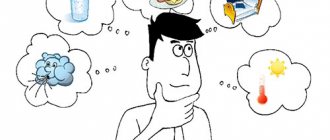Category: Useful
339
Article rating: 5
As I already said, this is the lowest need, but it is very important, because without it a person cannot survive. That is, for example, if a person has nothing to eat, then he will first of all think about where to get bread, meat, or at least something to satisfy his hunger. When there is enough food, a person immediately reveals other, higher needs.
In general, this need reflects a pattern. After all, for example, hunger is not some kind of human whim. This is a physiological need that is inherent in every person. Imagine for yourself whether you would think about some purchase, for example, fashionable shoes, if you did not eat and your stomach was simply “sucking” from the inside.
Let's move on.
Safety
The need for protection and stability is the second step of the pyramid. This need begins to concern a person after he satisfies his physiological needs. A person needs protection from the dangers that await him in the world around him, and he also needs to know that his physiological needs will be satisfied in the future.
This confidence can be easily realized through the purchase of insurance policies or, for example, in the guarantees that the state and employer give us: pensions and social security. People need confidence that their work is reliable and nothing will happen, that they can continue to live and not bother, so to speak. The logic here is the same as for physical needs: when some extreme situations happen, the need for safety is the most important, the most necessary, a person can’t think about anything else.
Sensory cognition
Sensory cognition is the first type of cognitive activity available to humans. It is carried out through the perception of the world based on the activity of the senses.
- With the help of vision, an individual perceives visual images, shapes, and distinguishes colors.
- Through touch, he perceives the surrounding space by touch.
- Thanks to the sense of smell, a person can distinguish more than 10,000 different odors.
- Hearing is one of the main senses in the process of cognition; with its help, not only sounds from the surrounding world are perceived, but also knowledge is disseminated.
- Special receptors located on the tongue allow a person to feel 4 basic tastes: bitter, sour, sweet, salty.
Thus, thanks to the activity of all senses, a holistic idea of an object, an object, a living being, or a phenomenon is formed. Sensory cognition is available to all living beings, but has a number of disadvantages:
- The activity of the senses is limited, especially in humans. For example, a dog has a stronger sense of smell, an eagle has vision, an elephant has hearing, and an echidna has a stronger sense of touch.
- Often sensory knowledge excludes logic.
- Based on the activity of the senses, the individual is drawn into emotions: beautiful images cause admiration, an unpleasant smell causes disgust, a sharp sound causes fear.
()
According to the degree of knowledge of the surrounding space, it is customary to distinguish the following types of sensory knowledge:
- 1st view - sensation . It represents a separate characteristic of an object, obtained through the activity of one of the sense organs.
Example. Nastya smelled hot bread while walking down the street; it was brought by the wind from the bakery where bread was being baked. Petya saw a shelf with oranges in the store window, but he did not have money with him to go in and buy them.
- 2nd type - perception . This is a set of sensations that creates a holistic picture, a general image of an object or phenomenon.
Example. Nastya was attracted by the delicious smell, went into the bakery and bought bread there. It was still hot, with a crispy crust, and Nastya ate half of it at once during lunch. Petya asked his mother to buy oranges at home, in the store opposite the house. They were large and bright in color, but they tasted sour and disgusting. Petya could not finish even one piece of fruit.
- 3rd view – presentation . This is the memory of an object, a subject explored earlier, thanks to the activity of the senses.
Example. Feeling the familiar smell of bread, Nastya immediately wanted to have lunch; she well remembered the crispy crust of a fresh hot loaf. Petya, having attended a friend’s name day, grimaced at the sight of oranges on the table; he immediately remembered the sour taste of the recently eaten fruit.
Social affiliation
Human needs human. After the first two steps of the hierarchy have been completed: the person is well-fed, everything is fine financially, and he is safe, he understands that he is lonely and this weighs on him. He begins to look for a soul mate.
He needs support from others, he needs to know that he is accepted for who he is. He needs companionship, friends, family, love who will accept him as one of their own so that he can be comfortable with them. He needs to know that he belongs to a certain group of people, clan, team, class.
If this need is not satisfied, then the person simply will not be able to live in society, he will experience social maladjustment, and other more serious problems are possible.
↑ Intuition
Cognition cannot be reduced only to sensations and thinking.
Intuition occupies an important place in the process of cognition, as well as in creativity. Intuition
- direct comprehension of the truth as a result of “insight”, sudden understanding without direct reliance on logical proof, rational thinking.
Both the scientists and thinkers of the ancient world (Plato, Aristotle) and the present time attached great importance to intuition in knowledge. Intuition uses the data of sensory knowledge, but is not it. Intuition is not rational knowledge, since reason does not directly involve logic.
Next step: the need for respect
Any person needs an understanding that he does not live in vain, that his actions are valued. That is, every person needs recognition. It is important for him to know that his work and his achievements deserve only the highest praise.
An individual needs the feeling that he is the best, that he is competent in matters that he decides, that he is independent and free. But his reputation and prestige are also important to him.
If this need is satisfied, then the person becomes self-confident, he understands that someone needs him, that he is useful. A person becomes strong in spirit.
If this need is not satisfied, then the person immediately becomes helpless, weak, and perhaps even humiliated. Depression and despondency accompany such people.
Maslow also notes that only self-esteem that is based on well-deserved recognition, and not on the flattery of others or some single success, can be considered normal and adequate.
LiveInternetLiveInternet
Basic human needs
Need is a psychological state of insufficiency of something or a person’s need for something, manifested in the form of desires, aspirations and drives.
Human needs are:
- biological
— social
- spiritual
Each of these needs can be dominant and secondary, as well as stable and situational.
Biological needs include physiological needs and safety needs.
Social needs include the needs for love, recognition, respect, communication and power.
Spiritual needs include the needs for self-actualization and personal growth.
Hierarchy of needs
Human needs form a hierarchical structure, based on basic physiological needs and safety needs, in the middle - the needs of love and respect, and in favor - the needs for self-actualization.
Physiological needs . Satisfaction of basic physiological needs is necessary for human biological survival: these are the needs for breathing, nutrition, rest and sex, without which a person cannot strive for higher goals: “an empty stomach is deaf to learning,” as people say. Undoubtedly, the most reliable way to satisfy these needs is to have a stable, high income, to be a financially independent person . Unfortunately, it is money that provides all the most basic needs of a modern civilized person.
Security needs . The need for security and confidence in the future arises as a reaction to the world around us, which is sometimes hostile to humans. This is not only fear for one’s life and the life of loved ones, but also the threat of losing a job or home, fear of losing family, loved ones, a threat to a person’s honor and dignity, fear of contracting an incurable or simply some contagious disease. This also includes human needs for stability, law and order, predictability of events and freedom from fear and chaos. That is, these needs reflect a person’s interest in his safety. It is these needs that force a person to put bars on the windows, save money in bank savings accounts, purchase insurance, etc.
Needs for love and belonging . A person’s social needs are expressed in the desire to be involved in a community or group of people. Sometimes a person agrees to receive a low salary, put up with uninteresting work, turn a blind eye to some shortcomings of the people around him, but when meeting his friends, he proudly says: “And I work at the Taganka Theater. I remember Yuri Lyubimov once told me...” It is the social environment (family, company of comrades and friends, various public organizations) that makes it possible to satisfy this important need and cure a person from an inferiority complex, from loneliness, from feeling like an outcast from society.
At this level, people seek to establish attachment relationships with other people in their family or social group. So, the child wants to live in an atmosphere of love and care, in which all his needs are met and he receives a lot of affection. Teenagers, seeking to find respect in the form of recognition of their independence and independence, are drawn to participation in religious, musical, sports and other close-knit groups. Young people experience the need for love in the form of sexual intimacy, that is, unusual experiences with a person of the opposite sex.
In general, gathering into crowds, groups and teams is one of the main features of the human psyche . This creates a feeling of security (“together we are strong”) and self-worth (“I am one of them”). This creates a feeling that someone needs you, that you have someone to rely on in case of any difficulties in life. And if a person is passionate about some idea, no matter what - the fight against drugs or the protection of endangered fauna - then by teaming up with like-minded people, he can achieve much greater results than alone. Without like-minded people, it is difficult for a person to assert himself and feel his importance, so satisfying this particular need often makes a person happy and gives him the meaning of existence.
Needs for respect and prestige . When a person's need to love and be loved is sufficiently satisfied, the degree of its influence on behavior decreases, opening the way for esteem needs. Here we are talking about respect from colleagues and loved ones, about prestige, social success, awareness of self-worth, recognition from others... These needs can be divided into two types: self-esteem and respect by others. The first includes concepts such as competence, self-confidence, independence and freedom. A person needs to know that he is a worthy person, that he can cope with any tasks that life presents. Respect by others includes concepts such as prestige, recognition, reputation and status. Here a person needs to know that what he does is recognized and appreciated. At this stage, money no longer plays a decisive role: for example, for creative people and managers, a more important indicator is usually the social prestige of their work, rather than wages.
Needs for self-actualization and personal growth . The highest goal, the highest need of the individual is the desire for self-expression, self-realization, self-affirmation. At this level, a person strives to discover and make the fullest use of his talents and abilities. This is the level of a creative person striving to do something fundamentally new and leave behind something valuable.
However, self-actualization is very rare, since many people simply do not see their potential or do not know about its existence . They tend to doubt and even fear their abilities, thereby burying their talents in the ground.
***
You can sign up for individual training, get more exercises and a detailed explanation of each point of the theoretical part, as well as get a personal consultation by contacting the author . For those who practice yoga according to the program of the author's closed yoga school "Insight", all services are free, for others - by agreement.
My Skype: seahappiness
VKontakte page: https://vk.com/id39643953
PS Also visit my blog dedicated to issues of self-development using yoga methods: https://v-lavrov.livejournal.com/
Need for knowledge and understanding
Humans are naturally curious. Without development, it begins to bend, life ceases to bring joy. He always needs to learn something new, constantly develop, and keep up to date with the news. Otherwise, everything simply loses its meaning, life becomes like Groundhog Day. Yes, what can I say, a person can even become depressed from a lack of knowledge when life goes on without changes. But one can derive from this state - this need for knowledge must be satisfied.
In general, this need manifests itself already in infancy. It is even more pronounced in children than in adults. Moreover, this need develops on its own, regardless of any external factors.
Rational cognition
Rational knowledge is knowledge based on logical thinking. It differs from the sensory in important characteristics:
- Availability of evidence. If the result of sensory cognition are sensations obtained from one’s own experience, then the result of rational cognition are facts that can be proven using scientific methods.
- The systematic nature of the knowledge gained . Knowledge is not isolated from each other, it is interconnected into a system of concepts and theories, forming separate sciences.
Example. History is a science based on rational knowledge. All knowledge obtained with its help is systematized and complements each other.
- The presence of a conceptual apparatus . Thanks to rational knowledge, concepts and definitions are created that can be used in the future.
()
Methods of rational cognition are:
- logical method (the use of logical thinking in knowing something);
- synthesis (connection of individual parts, data into a single whole);
- observation;
- measurement;
- comparison (determining differences, similarities);
All existing sciences and teachings were created on the basis of rational knowledge.
Aesthetic need
At the penultimate level of Maslow's pyramid is the aesthetic need.
It is expressed in the aesthetics of designing the space around a person, that is, the need to satisfy the sense of beauty. It includes: fine arts, music, travel, theaters, museums, etc.
Sometimes even this stage can eclipse all others.
People who are deprived of these aesthetic pleasures and who are immersed in a world of ugly things, as well as ill-mannered, rude people, simply begin to get sick. And the only cure can only be immersion in the world of beauty and aesthetics.
Self-realization and authorship
Even if a person has satisfied all the levels of the pyramid that we talked about earlier, there is a chance that he will again feel dissatisfied. There will be a feeling that everything seems to be there, but something important is missing, THE MOST important thing. He needs to find his own business and start doing it. For example, a musician cannot live without music, an artist without painting, an engineer without design, a copywriter without writing texts, etc. A person needs to prove himself and his talent. That is, self-actualization is the embodiment of ideas and possibilities.
According to Maslow, self-actualization should be embodied in creating something useful for society, to improve people's lives.
This need is innate, but manifests itself only after all other steps have been completed. But there are people who feel this need even at lower levels. These are geniuses and talents. In this regard, Maslow said that such people create because they cannot satisfy their basic needs.
Ways to find information
In modern times, information search has become one of the ways to understand the world around us. A wide variety of media greatly increases a person’s cognitive capabilities. Thus, cognition is carried out through:
- printed publications (newspapers, books, magazines);
- Internet;
- television;
- radio broadcasting;
Using the Internet you can very quickly and easily find almost any information, but it is not always reliable. Therefore, when choosing ways to search for information, you need to be careful and check data in different sources.
()
Example. In 2012, many articles were published on the Internet that foreshadowed the end of the world. Some talked about an asteroid falling to Earth, others about global warming and flooding of the land surface. But this could be easily verified by finding research by different scientists about upcoming natural disasters and comparing their results with each other.
Pros and cons of Maslow's theory
Let's start with the positives.
The first thing I want to note is that for its time this theory was one of the most stunning, it changed the worldview of many.
So, the advantages:
- It is quite widely used in marketing and management.
After all, the theory shows well what needs of people and at what time organizations need to satisfy. For example, in times of crisis, the emphasis shifts to the needs of lower levels.
- On its basis, quite a few theories on motivation have been developed, which are still used today.
- Organized the needs. It became clear to people how an individual moves from satisfying one need to another.
- This theory can help you understand your thoughts, values, choose your direction of activity, and also understand what stage of life you are at.
- Thanks to it, you can make long-term plans and forecasts. Organizations can predict what people will need in 2-3 years. Thus, they can occupy this niche and make a good profit.
And in general, Maslow’s pyramid affected all sectors of life, business, etc. All people have encountered this theory in practice to one degree or another. For company managers, there is a lot of room for thought, because you can find out exactly what an employee needs at a certain stage, and in order for the work to be done well, you can motivate the person.
Now about the cons.
There are shortcomings in every theory, there is nothing to be surprised about. This theory has had and still has many critics. So, the main disadvantages of this theory include the following:
- When researching this theory, Abraham Maslow took only successful, active, healthy people as a model. But people are not the same, their behavior is different, so there cannot be any identical structure of behavior.
- It is not clear when and what need is satisfied. What satisfaction indicator should be taken? After all, one person may be satisfied that he has bread and water, but for another this is not enough.
- It is also impossible to explain the motives for a person’s extraordinary actions. After all, there are often cases when a person does something, but it is contrary to his interests and even jeopardizes his safety. For example, when firefighters save people in a burning house, they completely forget about their safety.
Or, for example, the behavior of creative individuals is also impossible to explain, because they may not satisfy their basic needs, for example, sleep or food, but satisfy aesthetic needs or, in general, the very last step - the need for self-actualization. Artists create non-stop and are not distracted even by food when they are inspired.
Also, this hierarchical principle is imperfect, since a very large number of people strive to satisfy several of their needs at once, they do not wait until the lower levels are satisfied, they need everything at once.
The rich inner world of man
The inner world of a person is his desires, goals, beliefs, worldview, ideas about himself and other people, values. You can notice your appearance immediately and appreciate its attractiveness, but with the inner world things are more complicated. At first glance it is invisible, but over time it manifests itself in a person’s communication and actions.
It often happens that an outwardly unattractive person still evokes sympathy due to his inner qualities. Conversely, a beautiful person quickly causes disappointment if he behaves stupidly, impudently, and selfishly. So the inner world and appearance, actions - form a single whole, making up a general idea of \u200b\u200ba person.











